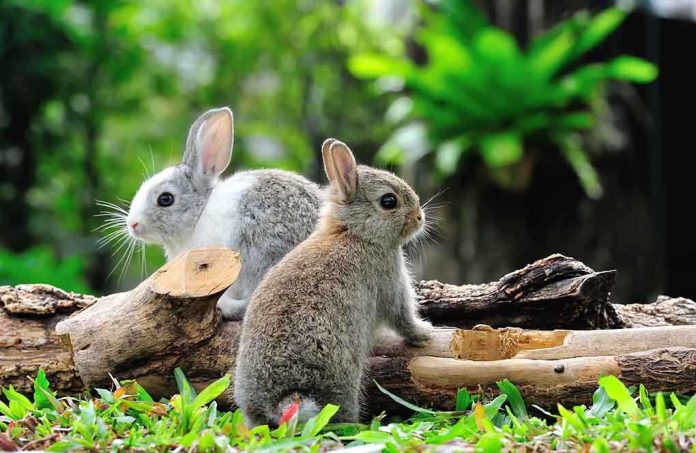
Bizarre “Frankenstein” rabbits with horrifying black spikes growing from their heads are spreading across Colorado, prompting wildlife officials to warn Americans to stay away from these infected animals.
Story Highlights
- Cottontail rabbits in Colorado develop black, tentacle-like growths from viral infection
- Shope papillomavirus causes dramatic horn-like protrusions but poses no threat to humans
- Wildlife officials advise against handling infected rabbits despite benign nature
- Domestic rabbit owners face greater risk as outdoor pets can contract severe infections
Viral Outbreak Spreads Across Colorado Neighborhoods
Colorado Parks and Wildlife confirmed multiple sightings of cottontail rabbits displaying shocking black growths protruding from their heads and mouths throughout Fort Collins and surrounding areas. The cottontail rabbit papillomavirus, also known as Shope papillomavirus, transforms normal skin cells into wart-like tumors that extend into dramatic horn or tentacle formations. These growths resemble “black quills or black toothpicks” according to wildlife experts, creating an alarming appearance that has sparked widespread concern among residents who encounter these infected animals in their neighborhoods.
First documented in the 1930s by Dr. Richard Shope, this DNA virus specifically targets rabbit populations and spreads through biting insects during warmer months. The current outbreak follows typical seasonal patterns, with increased transmission occurring when arthropod vector activity peaks. Wildlife officials emphasize the virus remains contained within rabbit populations and cannot jump to humans or other animal species, maintaining its species-specific infection pattern that has persisted for nearly a century.
Officials Reassure Public While Urging Caution
Colorado Parks and Wildlife issued clear guidance stating the virus poses no threat to humans or other wildlife, yet recommends avoiding contact with affected rabbits. Most infected cottontails survive the viral infection naturally, with growths eventually disappearing as their immune systems overcome the virus. The agency does not recommend euthanizing infected rabbits unless growths severely interfere with their ability to eat or drink, allowing nature to take its course in most cases.
Domestic rabbit owners face different risks, as house rabbits can contract more severe infections than their wild counterparts. Veterinary experts warn that outdoor domestic rabbits show greater susceptibility to serious disease progression, requiring protective measures to prevent exposure. The University of Missouri research confirms domestic rabbits experience more aggressive symptoms, making prevention crucial for pet owners who maintain outdoor enclosures or allow supervised yard access for their animals.
No Cure Available for Established Wildlife Disease
Medical experts confirm no cure exists for the Shope papillomavirus, reflecting the reality of most wildlife diseases that follow natural infection cycles. The condition remains generally benign in wild populations, with infected rabbits typically recovering without intervention as their immune systems develop resistance. This approach aligns with traditional wildlife management principles that avoid unnecessary human interference in natural disease processes, allowing ecosystems to maintain their biological balance through established evolutionary mechanisms.
'Frankenstein' rabbits with horrifying spikes growing from their heads are invading the US — and experts warn to stay away'https://t.co/G97afBHKZ8
— Naomi Morgan (@NaomiMorga46859) August 13, 2025
The outbreak demonstrates how sensational media coverage can create public alarm over well-documented natural phenomena that pose minimal actual risk. While the rabbits’ appearance shocks observers, scientific understanding reveals this virus has circulated in North American rabbit populations for decades without expanding beyond its original host species. Wildlife agencies continue monitoring the situation while educating the public about the difference between visually disturbing natural occurrences and genuine public health threats requiring emergency response measures.
Sources:
Wild rabbits spotted with strange ‘horn-like’ growths sprouting from their heads in Colorado
Rabbits with tentacle-like growths spotted in Colorado neighborhoods
Rabbits with tentacle horns in Colorado sparks concern in US as it has no cure
Colorado rabbits spotted with scary horns and tentacles on their head
Demon rabbits with tentacles spotted in parts of Colorado







